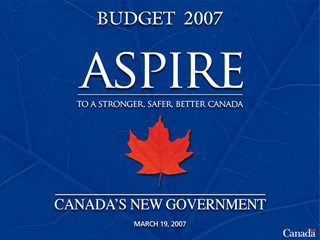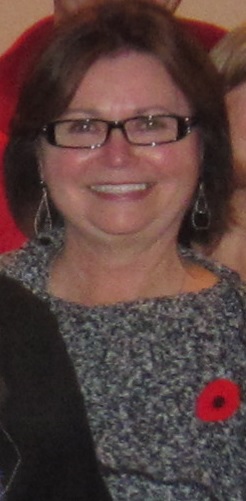Related Research Articles

Martin Brian Mulroney is a Canadian lawyer, businessman, and politician who served as the 18th prime minister of Canada from 1984 to 1993.

Paul Edgar Philippe Martin, also known as Paul Martin Jr., is a Canadian lawyer and politician who served as the 21st prime minister of Canada and the leader of the Liberal Party of Canada from 2003 to 2006.

James Michael Flaherty was a Canadian politician who served as the federal minister of finance from 2006 to 2014 under Conservative Prime Minister Stephen Harper.

Pierre Marcel Poilievre is a Canadian politician who has served as the leader of the Conservative Party of Canada and the leader of the Official Opposition since 2022. Poilievre has served as a member of Parliament (MP) since 2004.

The Canadian federal budget for the fiscal year 2006–2007, was presented to the House of Commons of Canada by Finance Minister Jim Flaherty on May 2, 2006. Among the most notable elements of the federal budget were its reduction of the Goods and Services Tax by one percentage point, income tax cuts for middle-income earners, and $1,200-per-child childcare payment for Canadian parents.
Several policies regarding interior and domestic issues in Canada were planned and adopted by the Cabinet of Canadian Prime Minister Stephen Harper, after he came to office as the head of a minority government on February 6, 2006. At the beginning of the government's appointment, five policy priorities were identified in the areas of federal accountability, tax reform, crime, child care and health care.

Lawrence Robert O'Brien is a Canadian businessman and politician. O'Brien served as the 58th mayor of Ottawa from 2006 until 2010. O'Brien was the founder and former Chair and CEO of Calian Technologies Ltd.
Nova Scotia is a parliamentary democracy. Its legislature consists of the Lieutenant Governor of Nova Scotia and fifty-five members representing their electoral districts in the Nova Scotia House of Assembly. As Canada's head of state, Charles III is the head of Nova Scotia's chief executive government. His duties in Nova Scotia are carried out by the Lieutenant-Governor, Arthur LeBlanc. The government is headed by the Premier, Tim Houston, who took office August 31, 2021. Halifax is home to the House of Assembly and Lieutenant-Governor. The House of Assembly has met in Halifax at Province House since 1819.

The Canadian federal budget for the 2007–2008 fiscal year was presented to the House of Commons of Canada by Finance Minister Jim Flaherty. Flaherty presented the 2007 budget on March 19, 2007. No income tax or GST cuts were announced but there were tax credits for some families with children under 18. The federal budget included $14 billion in new spending and $5.7 billion in tax cuts. This was the second budget of the 39th Canadian Parliament.

New shoes on budget day is an unusual tradition among Canadian Ministers of Finance. The tradition holds that the Minister of Finance should purchase or wear new shoes when the budget is delivered.

Judy May Foote is a Canadian former politician, 14th and current lieutenant governor of Newfoundland and Labrador. She is the first woman to hold the position.

The Canadian federal budget for the 2008-2009 fiscal year was presented to the House of Commons of Canada by Finance Minister Jim Flaherty on February 26, 2008.
The Canadian federal budget for the 2011–2012 fiscal year was presented to the House of Commons of Canada by Finance Minister Jim Flaherty on March 22, 2011, then again on June 6 following a May 2 election.

Scott Moe is a Canadian politician serving as the 15th and current premier of Saskatchewan since February 2, 2018. He is a member of the Legislative Assembly of Saskatchewan for the riding of Rosthern-Shellbrook, first elected in 2011. He served in the Saskatchewan Party cabinet from 2014 to 2017 under the premiership of Brad Wall, twice as minister of environment and also as minister of advanced education. In January 2018 he was chosen to succeed Wall as leader of the Saskatchewan Party. He led the party to a fourth consecutive majority mandate in the 2020 provincial election.
The Canadian federal budget for fiscal year 2012–13 was presented to the House of Commons of Canada by Finance Minister Jim Flaherty on 29 March 2012. Among the most notable elements of the federal budget were changes to Old Age Security and a reduction of the budget for the Canadian Forces and the Canadian Broadcasting Corporation.
The Canadian federal budget for fiscal year 2013–2014 was presented to the House of Commons of Canada by Finance Minister Jim Flaherty on 21 March 2013. The budget bill was tabled in the legislature on 29 April 2013 as the Economic Action Plan 2013 Act, No. 1. A second budget bill will be tabled in the autumn, which will include elements excluded from the first bill, such as the Canada Job Grant. The deficit was projected to be $18.7 billion for the fiscal year 2013-2014, however this was adjusted to $8.1 billion by end of the fiscal year and once the Auditor General's recommendations on the Government's unfunded pension obligations were taken into account.

William Francis Morneau Jr. is a Canadian businessman and former Liberal Party politician who served as minister of finance and member of Parliament (MP) for Toronto Centre from 2015 to 2020.
The Canadian federal budget for fiscal year 1988–1989 was presented to the House of Commons of Canada by finance minister Michael Wilson on 10 February 1988. It was the fourth budget after the 1984 Canadian federal election and would be the last before the 1988 Canadian federal election.
The Canadian federal budget for the fiscal years of 2020–21 and 2021–22 was presented to the House of Commons by finance minister Chrystia Freeland on 19 April 2021. The Canadian government did not produce a budget in 2020 due to the COVID-19 pandemic. Instead, the government produced a series of economic updates and stimulus plans throughout the year.
Several policies regarding interior and domestic issues in Canada were planned and adopted by the Canadian Cabinet, chaired by Prime Minister Justin Trudeau, following the October 19, 2015 election of the Liberal Party to a majority of seats in the House of Commons, such as social and environmental policies.
References
- 1 2 3 "Canada's deficits and surpluses, 1963-2014". CBC News. CBC/Radio-Canada. Retrieved 25 April 2015.
- 1 2 "The Leader-Post". news.google.com. 19 June 1971. Archived from the original on 2020-07-03. Retrieved 2020-06-17.
- ↑ "Gallup Canada | MacOdrum Library". library.carleton.ca. July 1971. Archived from the original on 2013-10-11. Retrieved 2020-07-01.